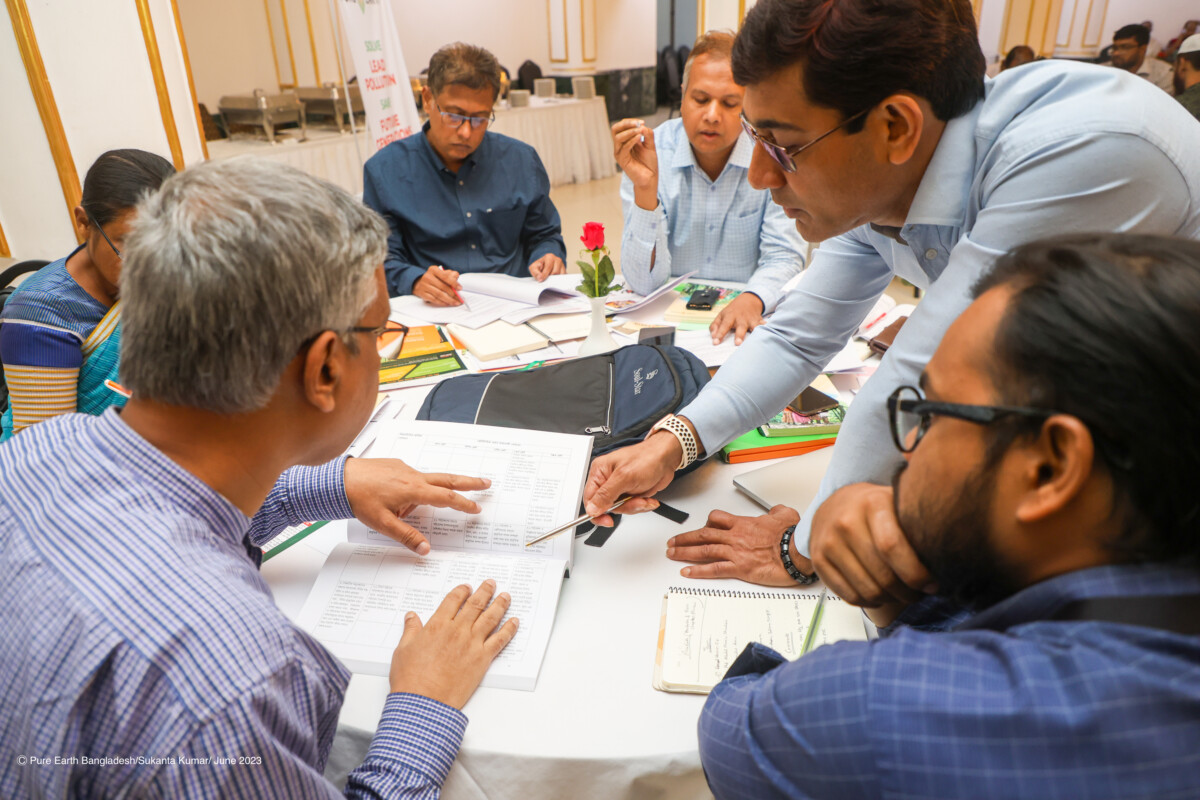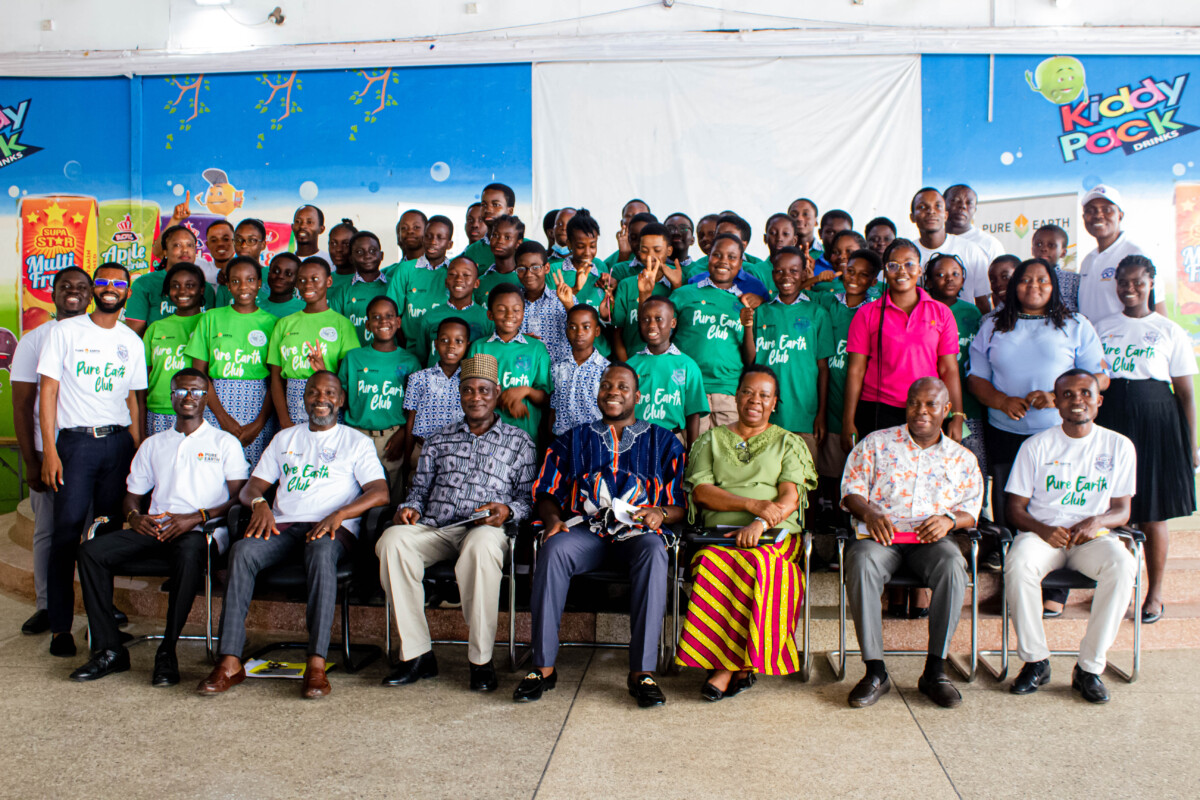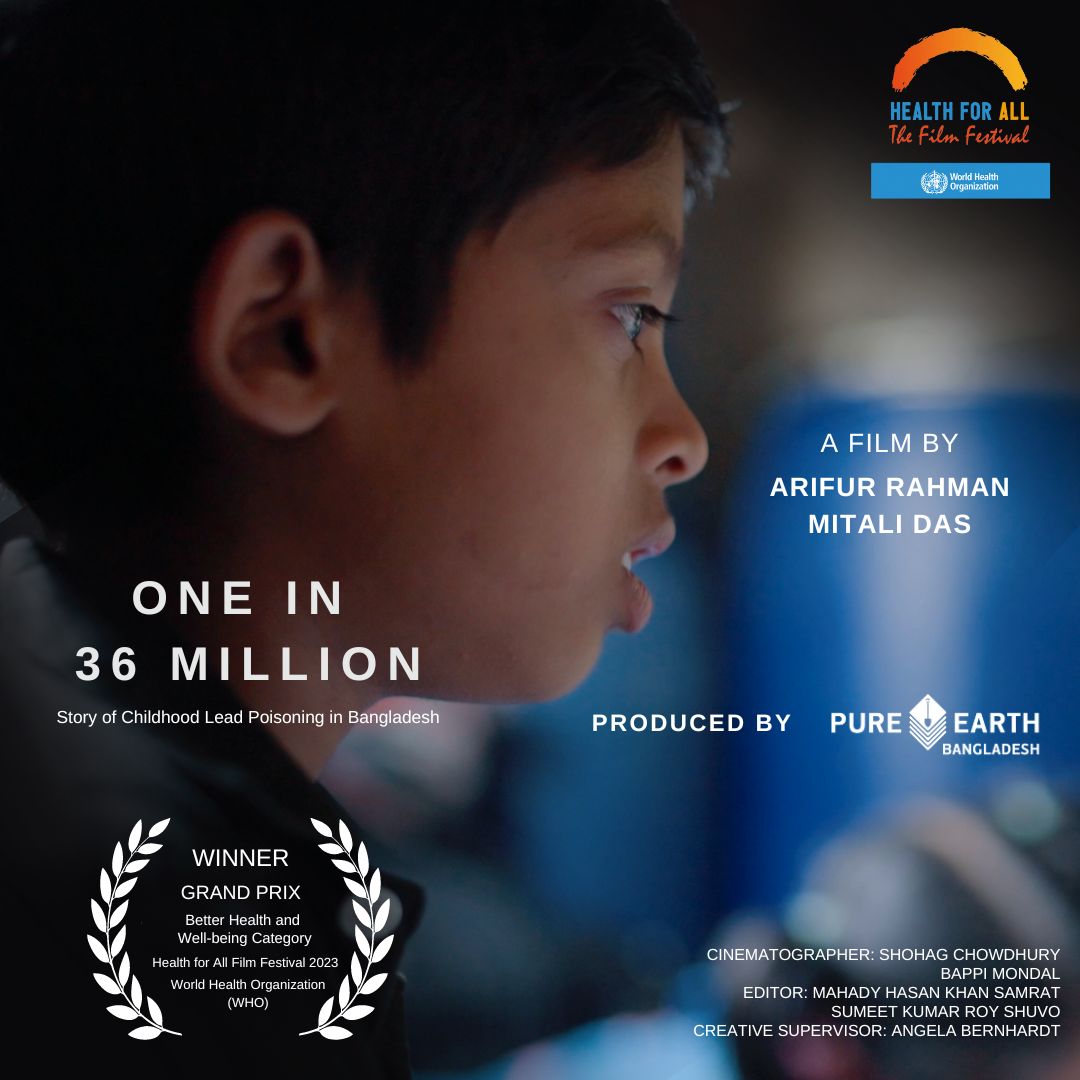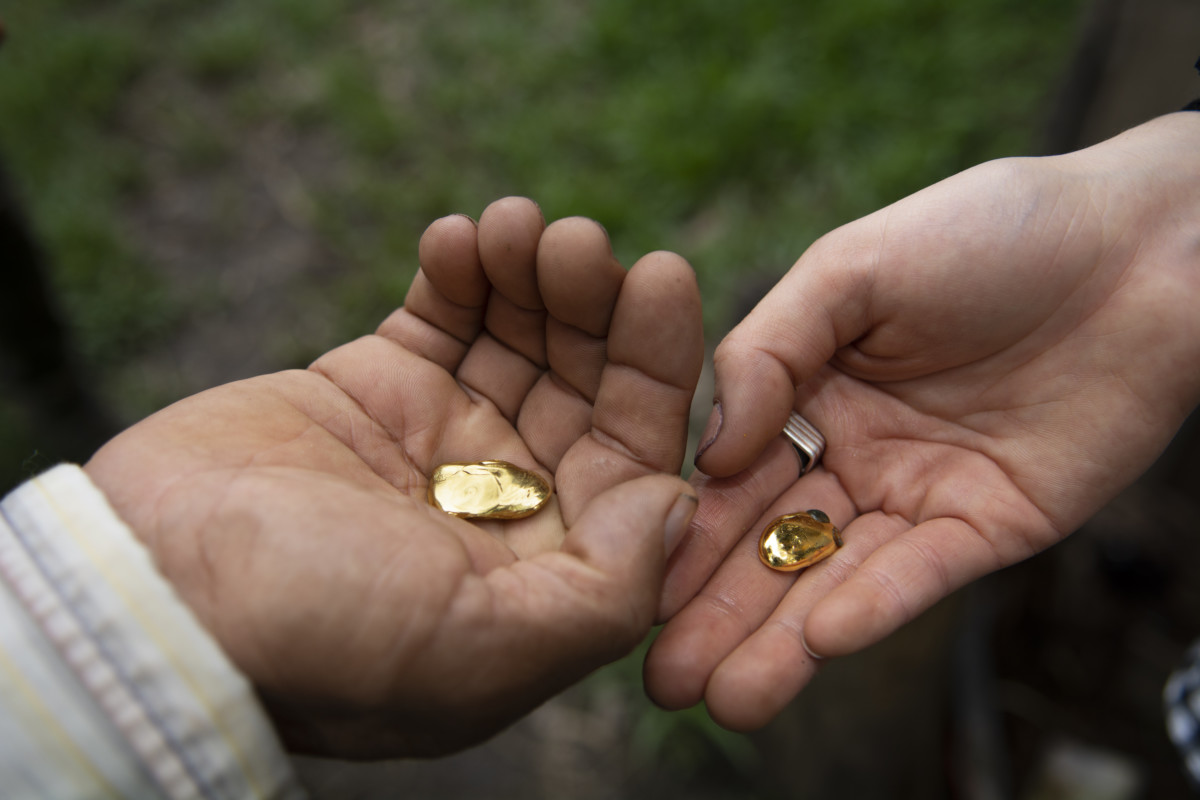2023 was a transformative year in our decades-long efforts to stem lead poisoning, mercury poisoning, and other toxic chemical threats. Our proven interventions, combined with data from our pioneering research, continued to draw the attention of major institutions around the world. As a result, more governments, funders, and policy organizations are interested in our “proven playbook” of cost-effective solutions.
This has set in motion new efforts toward systematic programs that will not only protect children today, but will also ensure that millions more children will be protected in the years to come. Creating systemic, sustainable change that can be scaled-up and replicated, country by country, can protect children most at-risk, and stop the multi-generational cycle of poisoning. Our approach is working. Here are some of the highlights from 2023.
Progress in the Philippines

(Photo: Pure Earth Philippines)
In 2023, the government of the Philippines announced that it would be including screening for lead poisoning in their national environmental health action plan. This was just three years after the release of The Toxic Truth report in 2020 from Pure Earth and UNICEF, which revealed that 1 in 3 children worldwide is lead poisoned. The Pure Earth Philippines team mobilized to assist the government meet these ambitious goals. Below is the timeline of events that resulted in this major. step forward.
- In 2021, Pure Earth suggested the government include testing for lead in their National Nutrition Survey. This kick-started a crucial national lead poisoning monitoring program, which collects lead poisoning data (alongside other health data that the country surveys) every three years.
- In 2022, the first lead poisoning survey, which tested about 3,000 children and pregnant women across 13 regions of the Philippines, confirmed that 1 million children in the country, ages five to nine years, have elevated blood lead levels.
- In 2023, to help determine how Filipino children were being exposed to lead, Pure Earth investigators visited 65 vendors in 7 markets across the Philippines to sample hundreds of consumer products for lead contamination as part of the global Rapid Market Screening (RMS) survey. They found that 24% of aluminum pots, 13% of glazed ceramic food ware, and 16% of house paint were contaminated with high levels of lead.
- Pure Earth investigators then visited the homes of children identified with high blood lead levels to test products used in the home, using RMS findings as a guide.
- Pure Earth team members shared the results with families, and provided educational materials to empower the families with the knowledge to protect themselves from lead, and keep sources of lead out of their homes. At the same time, Pure Earth also helped the families replace lead contaminated items like cookware with lead-free alternatives.
- Families with children identified with high lead levels were also connected to doctors for health consultations. It was important that lead-affected families knew that they were not left alone.
- At every step of the way, Pure Earth work was done in partnership with local governments, with data openly shared.
- As a result, our work (and good feedback from communities) attracted the attention of health officers from local government units that wanted to learn how they could do similar testing in their own localities.
- The momentum resulted in the government of the Philippines including lead poisoning in their national environmental health action plan.
- Pure Earth will continue expanding our reach in the Philippines, and supporting local government.
Progress in India

In India, the Pure Earth team’s approach focused on building up awareness and support for addressing childhood lead poisoning through the sharing of data at high level briefings with government officials, experts, and industry leaders. In 2023, our work planted seeds for change in Bihar and Maharashtra state, with a decision on national-level action looming on the horizon.
Here is a brief timeline of the accelerating momentum towards change on the issue of lead poisoning in India, where 275 million children are affected.
- In 2022, the Indian government released their response to The Toxic Truth report from Pure Earth and UNICEF about the childhood lead poisoning crisis. Their assessment confirmed Pure Earth’s findings that half of the Indian population is significantly impaired from lead exposures, and they concluded that the problem could no longer be ignored.
- To help push for next steps, the team organized a briefing to discuss solutions for India. Over 200 people attended the event, which was also live streamed on Youtube, resulting in 180 media reports across India about the issue. This became the impetus for discussions with decision makers across the spectrum of Indian politics and industry, which pushed awareness of lead poisoning in the country to one of its highest levels ever.
- In April 2023, Pure Earth built on that momentum for change with a high-level meeting highlighting opportunities for the government to take a leadership role in the national and global fight against lead poisoning via its G20 Presidency. That event reached approximately 47 million people with reports in prominent local news outlets. The meeting’s recommendations were presented to the Ministry of Health and Family Welfare and the Prime Minister’s office.
- In July 2023, the team put the focus on Bihar, securing a commitment from local officials to make Bihar a lead pollution-free state. This followed a high-level conference at which Pure Earth and partners shared data from Bihar blood lead testing and an analysis of everyday products contaminated with lead. A Minister from the Bihar government remarked, “This new research is an eye-opener and calls for immediate and urgent actions to identify, control, and remove lead contamination.”
- 2023 also saw Maharashtra state in India included as part of a global project that will take place in five countries (see below). The project will strengthen the state’s health system’s ability to collect, store, and analyze childhood lead exposure data; provide training to improve local expertise, and raise awareness through the dissemination of information about lead exposure.
Strengthening Systems in Five Countries to Take on Lead Poisoning

Despite the enormous long-term health and economic harms of lead exposure, lower-income countries lack systems and technical capacity to effectively address it. Lead poisoning is a healthcare issue, and in 2023, Pure Earth secured a commitment from the global pharmaceutical leader Takeda, the first from a donor in the healthcare industry, to fund a major project to strengthen the healthcare systems of five countries to address lead.
Pure Earth will help the five countries–Colombia, Indonesia, India (Maharashtra state), Kyrgyzstan, and Peru–strengthen their healthcare systems to identify, monitor, treat, and reduce childhood lead exposure and poisoning. A broad health education and awareness raising program will benefit an estimated 1.4 million parents, teachers, and schoolchildren in those countries, and set the foundation to protect children for years to come. Watch to learn more.
Looking for Lead Contaminated Products in Markets Across 25 Countries

In 2023, Pure Earth published research on global sources of lead exposure with the completion of the Rapid Market Screening (RMS) project, an ambitious first-of-its-kind global investigation of over 5,000 products across markets in 25 low-and middle-income countries.
RMS findings show that 20% of samples exceeded thresholds, especially spices, and that metal cookware and ceramic foodware are emerging as a concern globally.
Are these lead-contaminated consumer products responsible for poisoning children at home? To answer that question, Pure Earth began visiting the homes of children identified with high lead levels to test products used by the children and their families.
Together, the RMS research and these home-based assessments are increasing our understanding of how children are exposed and poisoned at home, beyond what our Toxic Sites Identification Program (TSIP) has been documenting in assessing polluted hotspots.
The findings confirm that we should pay attention to contaminated spices and cookware as sources of lead poisoning, in addition to pollution from informal used lead-acid battery recycling.
Going forward, the RMS survey findings will provide future direction for research and interventions, and will contribute to the formulation of a set of global priorities to reduce lead exposure. The study is being submitted for publication in a peer-reviewed journal.
Reaching Young Minds To Change The Future

In Bangladesh and Ghana, Pure Earth teams have taken up the challenge to educate students to help secure a lead-pollution free future.
In 2023, the Pure Earth team in Bangladesh began working on plans to incorporate information about lead poisoning pollution and prevention into the national curriculum, potentially reaching about 16 million primary school students and their families. A workshop organized with the National Curriculum and Textbook Board (NCTB) drew educators from around the country. Participants suggested a three-phase approach with information included in Social Science, Science, and Mental and Physical Health teaching materials.
Pure Earth will work to incorporate the feedback into a teacher’s handbook guide and a book chapter. The revised chapter could be introduced in the new edition of the 2024 primary-level textbook mainly for the students of 5th grade. Pure Earth will also develop audio-visual materials for the NCTB mobile app so teachers can learn about the various impacts of lead pollution. Furthermore, Pure Earth plans to conduct workshops around the country at the district level to reach the teachers across the country.

In Ghana, Pure Earth school clubs continue to be an avenue to build a grassroots movement to respond to the lead crisis. In addition, in 2023, the team organized an event at one of the largest senior high schools in Ghana to mark Earth Day. More than 200 students and staff attended the event to learn what Pure Earth Ghana was doing to protect children from toxic pollution. The team spent the day engaging the student community on the need to call on the government to invest in policies and programs that help protect the environment and health. Five national news outlets covered the event.
Telling the Story of Lead Poisoning Through a Global Platform

In 2023, Pure Earth Bangladesh’s six-minute film about one boy’s struggle with childhood lead poisoning took the Grand Prix prize at the World Health Organization’s (WHO) Health For All Film Festival in the Better Health and Well-being category. The recognition from WHO has given the film access to an even bigger global audience, where the boy’s story will help raise awareness about the issue in Bangladesh and around the world, and push decision makers to take action to help millions of children.
“The lesson is that there is something you can do about it,” said Dr. Francesco Branca, WHO Director of Nutrition and Food Safety and a 2023 festival juror. “Health authorities, civil society, government authorities can first of all identify the issue, then they can act on it and prevent many more from being affected. So this is a story of one family, but it’s a story that affects many people in Bangladesh and the world…”
Toward Management of Lead Waste in MERCOSUR Countries
In 2023, Pure Earth Colombia developed a methodology for calculating the lead mass balance for countries that are part of the MERCOSUR group, with information available for Argentina, Brazil, Paraguay and Uruguay. The tool will gather information and propose strategies for the management of hazardous lead waste in these countries.
Launching Nationwide Educational Resource for Potters to Go Lead-Free
In Mexico in 2023, Pure Earth started CREA (Centro de Recursos Alfareros), an educational website, where artisans can find all they need to create lead-free pottery. This website will continue to be developed alongside Universidad Iberoamericana. These materials will enable Pure Earth expertise to reach more traditional potters, who often live in rural areas, across the country.
Achieving a Series of Firsts to Reduce Mercury Pollution

In Colombia, the Pure Earth team accomplished a logistical and engineering triumph, developing the first temporary mercury storage unit for use in Latin America. In June 2023, following ten months of work, the team delivered the unit to the regional environment authority for the Santander region of Colombia. The unit was developed according to protocols for the safe handling and disposal of mercury at national and international levels, and adapted to meet the needs of the local government. This is an important step in reaffirming Colombia’s commitment to the Minamata Convention, and promoting the responsible disposal of mercury in the country and beyond.
In October 2023, four artisanal and small-scale gold mining (ASGM) communities trained by Pure Earth became the first in the region to achieve Fairmined certification in the Peruvian Amazon, verifying their responsible techniques. The miners are further pushing ahead for an even higher level of recognition, and are working hard to get certified to produce Fairmined Ecological gold by the end of 2024.
Their success has proven to the world that responsible artisanal gold mining can take place in the Amazon, and laid the foundation for the creation of the first “mined without mercury” gold supply chain from the Amazon. This has set an important precedent. Their efforts have the potential to greatly impact the development of a responsible mining community in Peru, while attracting the interest of national and international markets for responsibly-mined gold.
Funded by Brilliant Earth, a global leader in ethically sourced fine jewelry, and implemented by Pure Earth Peru and the Alliance for Responsible Mining, the project has been training miners in Madre de Dios in mining without mercury techniques and in reforestation based on Pure Earth’s responsible artisanal and small-scale gold mining model. Read a report of Pure Earth’s work with these miners in the Guardian.




